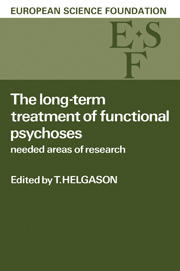Book contents
- Frontmatter
- Contents
- List of Participants
- Introduction
- I Organisational Aspects of Long-term Treatment
- Classification of functional psychoses requiring long-term treatment
- Structural changes in psychiatric hospitals
- Alternatives to hospitals: a field of promises and of not-yet answered questions
- The closing ofmental hospitals in Italy and its impact on long-term treatment of functional psychoses
- Future developments in Italy
- Optimal duration of long-term treatment in functional psychoses
- II Patients Aspects of Long-term Treatment
- III Public Health Aspectsof Long-term Treatment
- Index
The closing ofmental hospitals in Italy and its impact on long-term treatment of functional psychoses
from I - Organisational Aspects of Long-term Treatment
- Frontmatter
- Contents
- List of Participants
- Introduction
- I Organisational Aspects of Long-term Treatment
- Classification of functional psychoses requiring long-term treatment
- Structural changes in psychiatric hospitals
- Alternatives to hospitals: a field of promises and of not-yet answered questions
- The closing ofmental hospitals in Italy and its impact on long-term treatment of functional psychoses
- Future developments in Italy
- Optimal duration of long-term treatment in functional psychoses
- II Patients Aspects of Long-term Treatment
- III Public Health Aspectsof Long-term Treatment
- Index
Summary
Introduction
A new law enacted in May 1978, has significantly modified the Italian system of psychiatric patient care. The essential features of the new reform are: (a) since the date of the new act no ‘first ever’ has been admitted to a mental hospital as an in-patient (since July 1980, in our catchment area and in many other regions of the country, readmissions have also been prohibited); (b) all residential treatments, both compulsory and voluntary, have been undertaken in small psychiatric wards attached to general hospitals (the units have been established with an approximative ratio of 0.15 beds per 1000population); (c) it has been suggested that the greater part of long- and short-term care should be assigned to out-patient departments, and local health authorities have been invited to implement the resources for non-residential services.
The new organization of the psychiatric care system was inserted into an ongoing process which started many years before, and has produced a decline of patients resident in the large mental hospitas; moreover, in some instances, sporadic efforts have been carried out towards a comprehensive community-oriented mental health service.
In this context, the closing of Italian hospitals means: (a) the construction of new large mental hospitals is prohibited; (b) although new admissions to mental hospitals are not allowed, some people (mostly long-stay in-patients suffering from functional psychoses) continue to live in the large traditional hospitals; (c) there are psychiatric wards attached to general hospitals which deliver short-term residential treatments.
As regards long-term care for patients suffering from functional psychoses, at present it might be assumed that the most relevant characteristics of the Italian care system are: (a) a marked reduction in bed numbers for residential treatment, especially for those patients needing more than a 2-3 months’ stay; (b) a shortage of alternative settings (day hospitals, supervised hostels, group homes, etc.), unless old places with the same patients, now called ‘guests’, could be considered alternative facilities; (c) profound differences between regions and provinces, especially between the North and South, as to the phasing of the deinstitutionalization programme and the implementation of the new law.
Case-register studies
The background of this report was provided by evaluative studies carried out using a psychiatric case register. At the beginning, the studies concerned a health area near Pavia in Lombardia, a region of northern Italy (Torre, Marinoni & Allegri, 1982a; Torre et al., 1982b; Marinoni et al., 1983).
- Type
- Chapter
- Information
- The Long-Term Treatment of Functional PsychosesNeeded Areas of Research, pp. 39 - 46Publisher: Cambridge University PressPrint publication year: 1985

